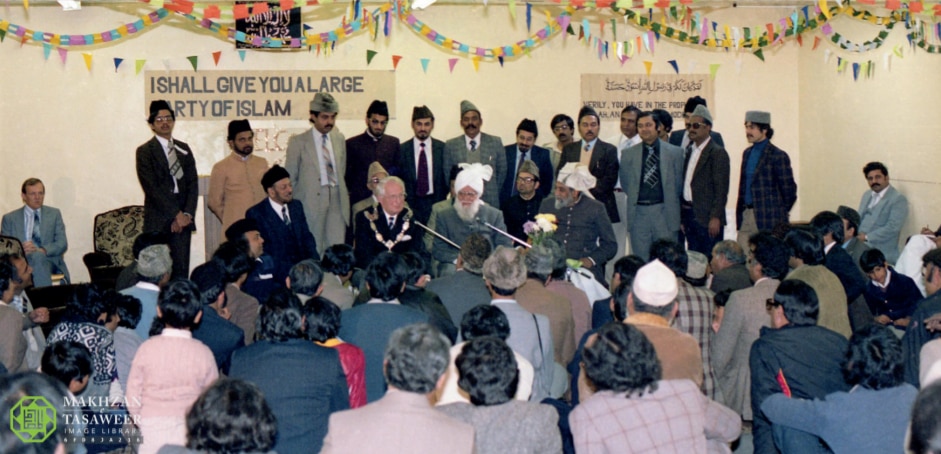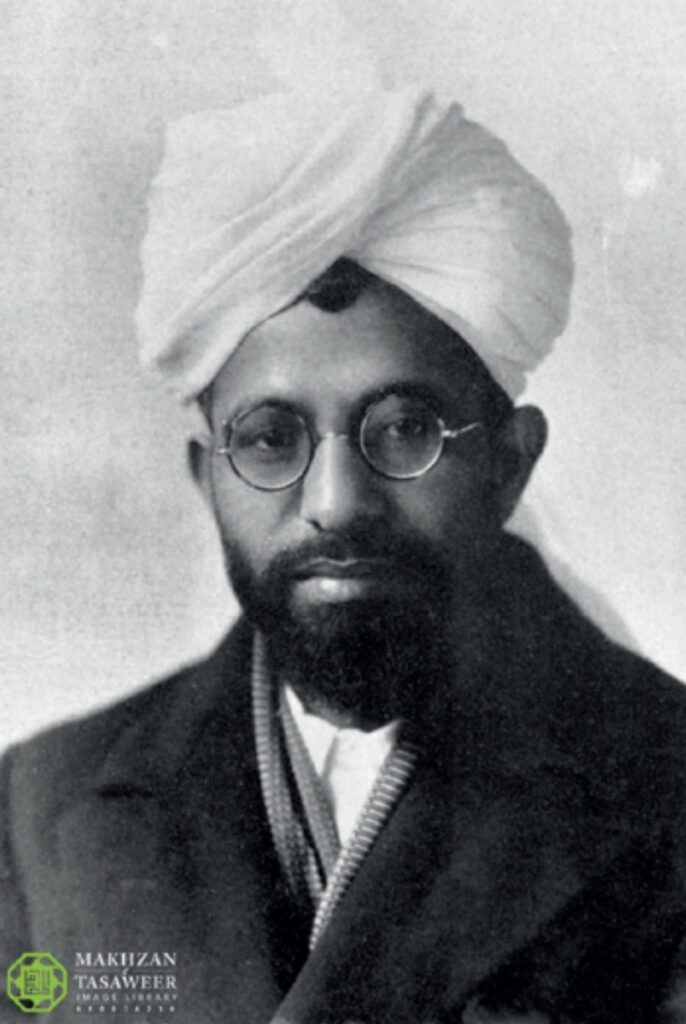
1 October 1942: Maulvi Muhammad Sharif Sahib, a missionary, reached Syria from Palestine to spread the message of Islam Ahmadiyyat.
Maulvi Muhammad Sharif Sahib says:
“When I had spent two or three years in Arabia, I prayed to Allah the Almighty to grant me such a long period of service here that no other missionary before me had.
“Therefore, God Almighty accepted my prayer and gave me the ability to serve for a longer period than Hazrat Syed Zainul Abidin Waliullah Shah, Hazrat Jalaluddin Shams and Hazrat Maulvi Abul Ata, may Allah be pleased with them all.” (Tash-heezul-Azhan, January 1978, p. 11)
1 October 1946: Hazrat Musleh-e-Maudra delivered a short address to Ahmadi ladies of Delhi. He urged the Lajna members to preach and follow in the footsteps of the female Companions of the Holy Prophetsa.
In this speech, Hazrat Musleh-e-Maudra, whilst mentioning the great sacrifices of the female Companions of the Holy Prophetsa, said:
“These were women whose sacrifices the Islamic world is proud of. You also claim that you have believed in the Promised Messiahas, who is the spiritual manifestation of the Holy Prophetsa. In other words, you are the spiritual manifestation of the Companionsra; however, [ask yourselves] whether you possess the same nur [divine light] that was found in the Companionsra. Are your children as pious as the Companions’ children? If you contemplate upon this matter, you will find yourselves far behind the Companions […].”
“I ask you, have you ever felt a strong urge in your heart for preaching [Islam Ahmadiyyat] and have you ever tried to understand what responsibilities you have after accepting Ahmadiyyat? [Simply accepting] Ahmadiyyat does not mean to simply donate a few rupees as chanda [financial sacrifice] or pour a few drops of water on your face and perform ablution and offer two or four prostrations; rather, Ahmadiyyat means to establish a relationship with God Almighty that connects the servant to God Almighty and the servant becomes one of God Almighty’s beloveds.” (Tarikh-e-Lajna, Vol. 1, p. 666)
2 October 1924: Hazrat Musleh-e-Maudra travelled to the shores of England where William the Conqueror landed. This was to fulfil a divine vision he had seen some years ago, wherein he was called “William the Conqueror”.
2 October 1928: Hazrat Mirza Sultan Ahmad, son of the Promised Messiahas, announced his allegiance with Jamaat-e-Ahmadiyya through an announcement in Al Fazl. He joined the Jamaat at the hand of his brother, Hazrat Musleh-e-Maudra in 1930.

2 October 1980: Hazrat Khalifatul Masih IIIrh inaugurated the Bradford Mission House in the United Kingdom.

3 October 1924: Hazrat Musleh-e-Maudra addressed the concluding session of the Conference of World Religions in London. On the same evening, he also called a special session of shura (consultation) to discuss The Review of Religions magazine and the selection of topics and various other matters regarding it. (Tarikh-e-Ahmadiyyat, Vol. 4)
3 October 1971: Hazrat Khalifatul Masih IIIrh inaugurated the Khilafat Library in Rabwah.
3 October 1974: Abdul Hameed Sahib was martyred in Kunri, Sindh.
With the initiative of Jamaat-e-Islami, a conspiracy was hatched against Dr Rashid Ahmad Sahib, and a false rumour was spread that he had burnt the Holy Quran. On 3 October, a rally was held in opposition to the Ahmadiyya Jamaat, which was attended by students and city thugs. This was backed by Jamaat-e-Islami and the police. Dr Rashid Sahib’s clinic was attacked and destroyed, and his cattle pen was set on fire. (Let it be known that having and looking after cattle is a norm in Pakistan.)
When Abdul Hameed Sahib proceeded to rescue the cattle, one of the mobs shot at him. He was martyred on the spot.(Khutbat-e-Tahir, Babat Shuhada, p. 165, Friday Sermon, 25 June 1999)
4 October 1903: Hazrat Hakim Maulvi Nuruddinra travelled to Kapurthala to attend to a patient, Hazrat Muhammad Khanra. Hazrat Hakim Maulvi Nuruddinra also delivered a sermon during his short stay there. In this address, he preached to people of all schools of thought in a new way and quenched the spiritual thirst of the people by citing events and examples from his life. (Tarikh-e-Ahmadiyyat, Vol. 3, p. 163)
4 October 1924: On this day, Hazrat Musleh-e-Maudra, along with members of his entourage – including the new missionary of London, Hazrat Maulvi Abdur Rahim Dardra – went to the house in Putney, London which was to be opened in the proposed mosque. Huzoorra went to the room where prayers were offered in those days and led everyone in a silent prayer. After that, he handed the key to Hazrat Maulvi Abdur Rahim Dardra and gave detailed instructions to Hazrat Malik Ghulam Faridra, who served as Hazrat Maulvi Abdur Rahim Dard’sra deputy. (Tarikh-e-Ahmadiyyat, Vol. 4, p. 455)

4 October 1947: While in Lahore, as it was early days of the partition of the Indian subcontinent, Hazrat Musleh-e-Maudra penned a powerful article about the intense and terrifying state of affairs. This inspirational piece was published in Al Fazl and raised the morale of members of the Jamaat to bravely face the coming hardships.
Hazrat Musleh-e-Maudra had the great ability to safely deliver members of the Jamaat from dangerous areas to safety during the partition.
However, back in Qadian, villagers who lived just outside of Qadian and were forced to seek refuge in Qadian, made the dangerous decision of travelling by foot to Lahore. They decided this without consultation from the Jamaat. Without proper leadership and organisation, this caravan of around 40,000 people came under brutal attack as soon they stepped out of Qadian’s boundaries. This sudden ambush saw many causalities and devastation.
5 October 1952: Indonesia’s Armed Forces Day was organised. An Ahmadi missionary, Syed Shah Muhammad Sahib, was also invited to attend this national event. Ahmadi Muslims had been part of the struggle for the independence of Indonesia and always remained loyal to the country. (Al Fazl, 7 December 1952, p. 5)
5 October 1974: Carnage in Sargodha, Pakistan remained rampant all day. An Ahmadiyya mosque was demolished. 38 houses and shops belonging to Ahmadi Muslims were set on fire after being looted and five Ahmadis were seriously injured, all whilst the Punjab Chief Minister was present in the city. (Al Fazl, 6 October 1974, p. 4)
6 October 1942: Hazrat Musleh-e-Maudra announced an exclusive scheme for tabligh in India. The first objective of the scheme was to send 1,000 issues of Al Fazl that contained the transcript of his weekly Friday Sermon to all Muslim scholars. He also instructed for 1,000 copies of The Moslem Sunrise to be sent to them. Secondly, he urged for constant tabligh to influential personalities of the country. (Tarikh-e-Ahmadiyyat, Vol. 8, p. 349)
7 October 1915: Hazrat Mir Qasim Alira started publication of his newspaper, Faruq from Qadian. This powerful medium of tabligh continued rendering its services until the sad demise of Hazrat Mir Sahibra in April 1942.
For further details, please visit: www.ahmadipedia.org/content/periodical/27
7 October 1927: A companion of the Promised Messiahas, Hazrat Munshi Abdullah Sanaurira passed away. He will always be remembered for his presence when the sign of the red ink drops was shown to the Promised Messiahas. As per his will, the sacred shirt that bore marks of the red ink was buried with him. This was a precautionary measure to prevent any possible element of shirk [association of partners with Allah].
For further details, please visit: www.ahmadipedia.org/content/personality/4
7 October 1974: Basharat Ahmed Sahib was martyred in Tahal district of Gujarat. He was born on 1 November 1948. He was Ahmadi by birth. After completing his studies in 1966, he joined the army. In 1974, riots and opposition against Jamaat-e-Ahmadiyya were fierce. In the holy month of Ramadan, he was martyred after being attacked by an armed group of thugs. (Khutbat-e-Tahir, Babat Shuhada, p. 165, Friday Sermon, 25 June 1999)

